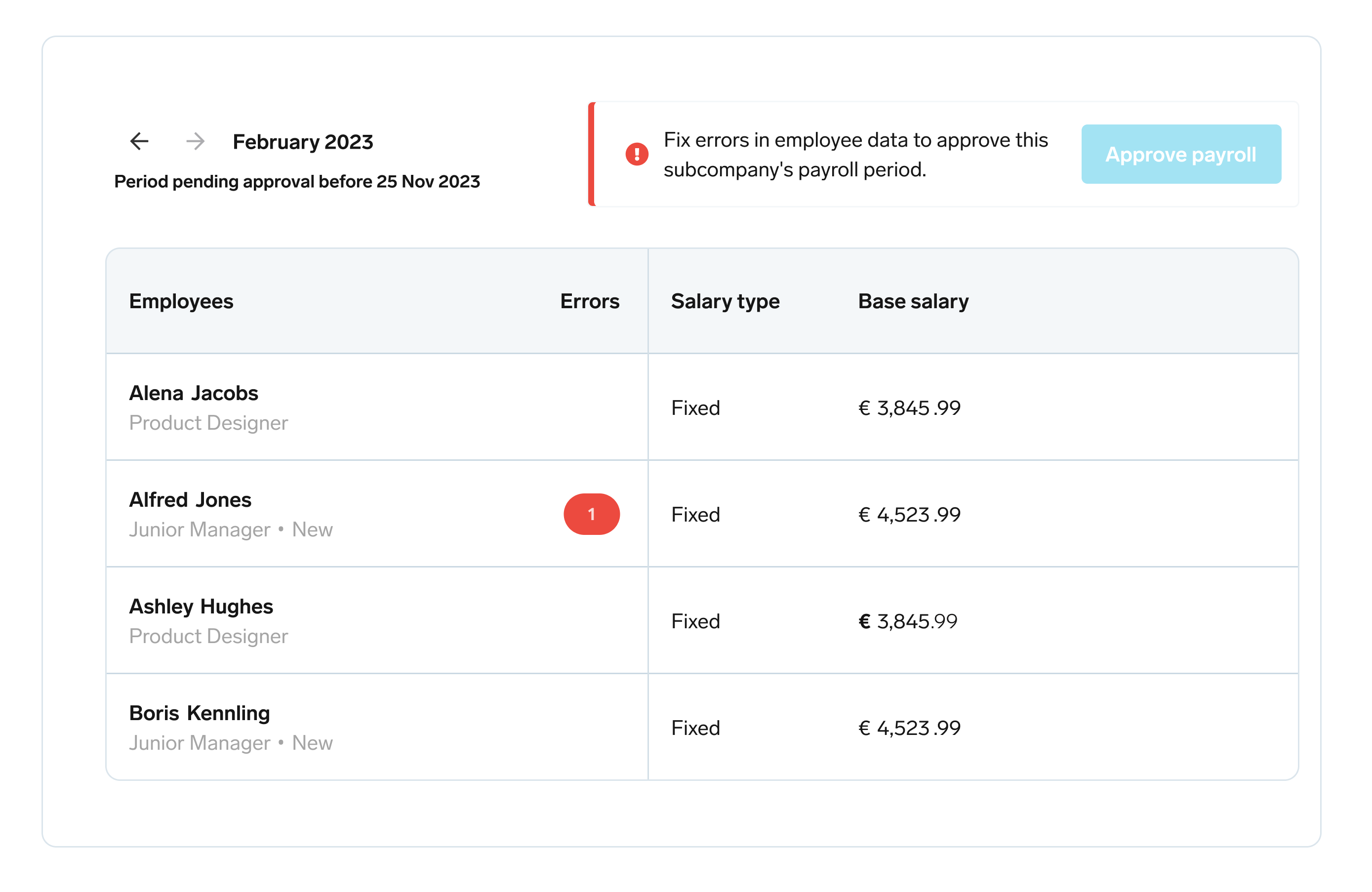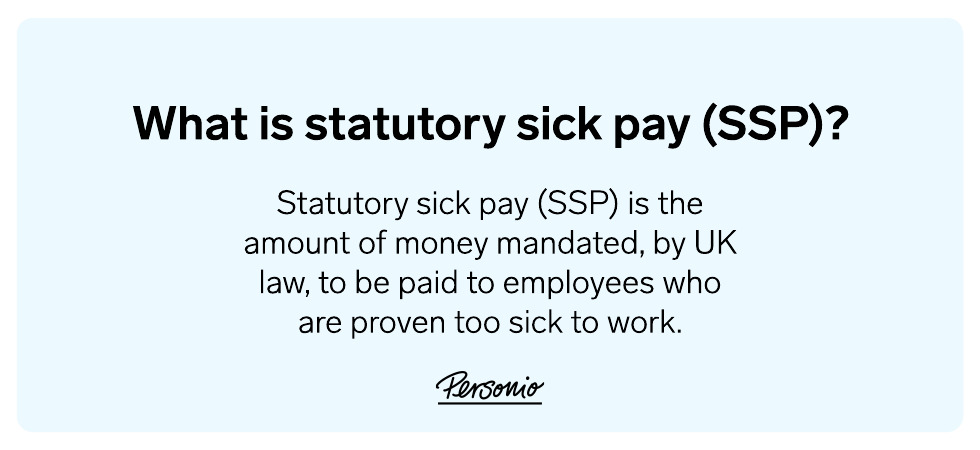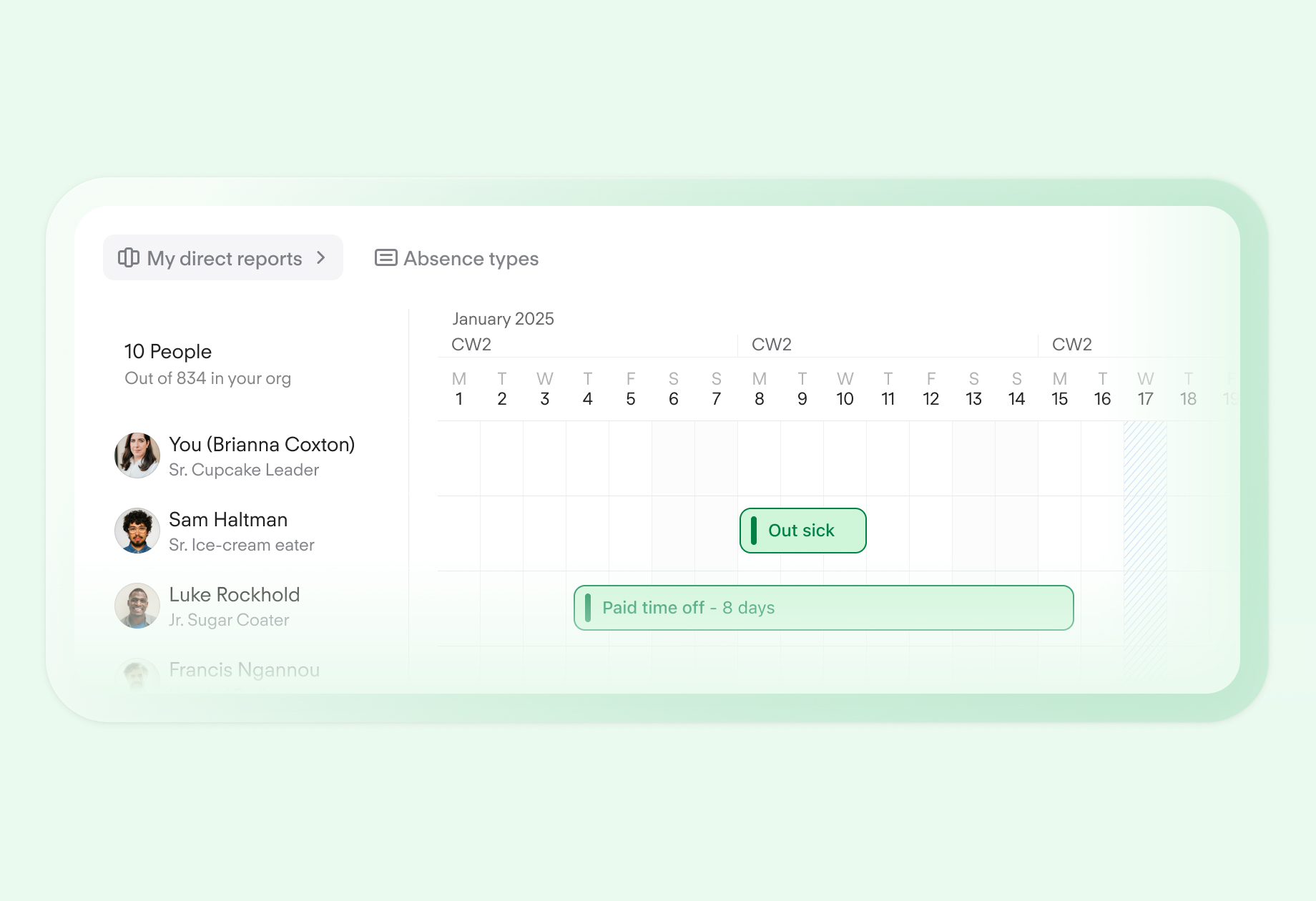
Start simplifying your payroll management
Learn how to streamline your payroll process to save time and ensure accuracy.
Read our guideStatutory Sick Pay (SSP) for Employers

Statutory Sick Pay isn't a cut-and-dry topic. In fact, it has a lot of nuances and comes with many questions. So, as an HR professional, it is all the more reason to know about it (in order to get it right). In this article, we cover all of the most popular questions, and more, so you can have a full grasp of the concept of Statutory Sick Pay.
Generate instant reports on illness across your org with Personio.
Contents
- 1What Is Statutory Sick Pay?
- 2Who is Eligible for Statutory Sick Pay?
- 3When Can Employees Take Sick Leave?
- 4What Happens if Employees Are Sick While on Holiday?
- 5How Much Do Employees Get Paid with Statutory Sick Pay?
- 6It’s All About What’s Written in Your Employment Contracts
- 7Taking Sick Leave: Frequently Asked Questions
- 8HR Best Practice: Track & Reporting On Employee Sickness
What Is Statutory Sick Pay?
Statutory Sick Pay (SSP) is the amount of money that the UK Government has mandated, by law, that every employee must be paid if they are too sick to work. Employees have to meet certain eligibility criteria to qualify for SSP. That said, the legislation around Statutory Sick Pay also doesn’t cover some people (such as self-employed individuals).
When Did Statutory Sick Pay Begin?
Statutory Sick Pay was put in place in 1983 to mandate and standardise the payment of sick pay to employees over extended periods of time. Initially proposed to cover employees for eight weeks, it was extended to the current 28-week period in 1985.
What Does Statutory Sick Pay Mean For Employers?
Statutory Sick Pay helps protect employers. Even though some will pay full pay during the first three days before SSP kicks in, they are not required to by law. Statutory Sick Pay is the minimum legal requirement that employers must pay to their employees. It is separate from a company sick leave policy, but your sick leave policy can include a reference to SSP.
In addition to any contractual sick leave entitlements, UK employees are entitled to Statutory Sick Pay if their employer doesn’t pay their usual salary while they are sick. The SSP sick pay entitlement covers employees who are experiencing long-term sickness (up to 28 weeks).
What Are The Main Questions Around SSP?
Some common questions surrounding Statutory Sick Pay include:
When does it kick in?
When are employees entitled to be paid SSP?
How much is it?
How long does it last?
What does this have to do with ‘pulling a sickie’?
Most employers understand that getting sick is something that happens to just about everyone. And, that taking the occasional day or two off to recover from a cold or flu is a normal part of work. That said, things can get a bit sticky when employees are really ill – or ill for a long time.
Who is Eligible for Statutory Sick Pay?
The rules regarding SSP are quite clear. To qualify individuals must be employees who are earning at least £118 per week and have actually worked for your company, they have to have been ill for at least 4 days in a row (including weekends). In addition, they need to tell you they’re sick by your deadline (and definitely within 7 days).
How Much Is Paid For SSP?
SSP can be paid for up to 28 weeks and employees will only receive SSP for ‘qualifying days’ (in other words, they will be paid for days that they are contracted to work). While the four-day rule covers when SSP can start, it doesn’t mean that employees will receive SSP if they weren’t supposed to work that day. So, if they are ill on a Saturday or Sunday and they aren’t contracted to work on weekends they will not be paid for these days. Here is a helpful Daily Statutory Sick Pay Rate Table here to work out what employees might be owed.
Click here to read our comprehensive guide to unpaid leave in the UK.
Manage Absences With Ease

Enable employees to quickly and efficiently apply for leave, automatically notifying their managers and marking them absent in their calendar once approved. Give HR a detailed overview of leave across the company.
Transform Your Absent ManagementWhen Can Employees Take Sick Leave?
The UK Government says, "Employees can take time off work if they’re ill. They need to give their employer proof if they’re ill for more than 7 days.” Most companies require employees to self-certify (i.e. to say that they are sick, but not necessarily go to a doctor) for up to a week of illness. Beyond a week, a doctor’s note – also called a ‘fit note’ – is required.
Essentially, sickness rights are laid out in the employment contract employees have signed with their employers and how employees are required to report illness is usually determined by their contract, too.
They can also vary widely: Some employees report that companies they have worked for in the past have required a doctor’s note after an absence of only two days! But it’s all about the balance of trust, contracts, work expectations and work culture. Regardless, it’s important that both employers and employees document illness and keep records.
What Happens if Employees Are Sick While on Holiday?
Believe it or not, if employees are ill just before or during their holiday, gov.uk says they can “take it as sick leave instead.” Whether this can be taken as normal sick leave under a typically more generous corporate policy (i.e. one that normally offers full pay during an initial sick leave period) is unclear but what is clear is that if the standard rules about Statutory Sick Pay are met before or during a holiday then SSP kicks in here, too.
How Much Do Employees Get Paid with Statutory Sick Pay?
According to the gov.uk website employees can get £94.25 per week Statutory Sick Pay if they are too ill to work. This is commonly known as a sick leave entitlement. To work out how much they are entitled to, exactly, the government has provided this helpful Statutory Sick Pay Calculator.
However, since the minimum wage in the UK is £7.70 per hour and an average workweek is 40 hours long, the mandated amount falls far short of earnings (£94.25 compared with £308 per week), even on minimum wage.
Since most corporate employees earn significantly more than minimum wage, with the average starting salary for UK graduates, according to a Bridgewater Resources survey, ranging between £19,708.00 for an English major and £29,068.00 for someone graduating with an economics degree, being paid only Statutory Sick Pay can seem a bit miserly to employees.
This is why many companies have sick pay schemes or occupational schemes that pay more generously than SSP and which are documented in employees’ contracts. Oh – and don’t forget – employees still have to pay income tax and National Insurance contributions on SSP! If employees wonder why the amount of SSP that appears in their bank account is lower than they might have anticipated, this would explain it.
When does Statutory Sick Pay Kick in?
Don’t forget that SSP doesn’t kick in until an employee has been sick for four days! Until then, it appears that employers are not required to pay sick leave.
Most employers are more generous than is mandated by law – tending to give employees a certain amount of leeway when they take sick leave. The amount of sick leave available, how much people are paid, and when they are allowed to take sick leave varies widely across companies.
It’s All About What’s Written in Your Employment Contracts
Ultimately, how much sick leave employees can take is covered by their employment contract and when employees get sick, it is the responsibility of an HR team, an employee’s line manager, and the employee themselves to negotiate.
For example, some companies have ‘duvet days’ written into their contracts. Others require employees to ‘earn’ sick leave (apart from Statutory Sick Pay, to which employees are entitled, regardless of what their contract says), and some allocate employees a certain amount of paid time off per year – to take as sick leave or annual leave – but which cannot exceed a defined value.
Whatever approach your company prefers to take to sick leave and sick pay, this should be documented in your contracts and the amount of leave – including sick leave – must be recorded for every individual, every time they are ill, regardless of whether they have been off work for long enough for Statutory Sick Pay to kick in.
Manage Absences With Ease

Enable employees to quickly and efficiently apply for leave, automatically notifying their managers and marking them absent in their calendar once approved. Give HR a detailed overview of leave across the company.
Transform Your Absent ManagementTaking Sick Leave: Frequently Asked Questions
How Do You Know if an Employee is Really Sick or just ‘Pulling a Sickie’?
Is an employee mysteriously absent on a Monday morning, or after they’ve had a big night out? Was there a deadline they had to meet and it feels like they’ve called in sick to avoid it? Are they going to significantly more dentist or doctor appointments than they should? These may all be an employee exhibiting signs of absenteeism.
What is ‘Taking a Sickie’ or ‘Pulling a Sickie’?
Taking a sickie or pulling a sickie is what happens when an employee lies about being sick (or exaggerates it) so they don’t have to come to work. One employment law advice firm says that “If an employee makes up or exaggerates an illness or injury in order to ‘pull a sickie’, this is potentially grounds for dismissal. The reason for this is that it amounts to a breach of the implied term of mutual trust and confidence that is the foundation of an employment relationship.”
When Should Employees Take Sick Leave?
In some corporate cultures, however, the fear of being seen to ‘take a sickie’ actually forces employees to keep on working when they should be resting and recovering! According to the CIPD’s Health and Well-Being at Work Survey, “The average level of employee absence this year (5.9 days per employee per year, or 2.6% of working time lost) is the lowest ever recorded”. This isn’t necessarily a good thing, though. They also report that 83% of respondents say people work when unwell and 63% say people use their holidays to work, or work when they’re off sick.
BBC Worklife reports that “experts say a shifting work culture is to blame for creating a stigma around taking time off” and according to a 2015 survey from UK insurance provider AXA PPP, “nearly 40% of employees don’t tell their manager the real reason for their absence when calling in sick because they’re afraid of being judged or disbelieved”.
There are various good reasons for employees to take sick leave when they are ill. Apart from the fact that they are unlikely to be able to produce work to the same level of quality when they are sick, going into the office increases the risk of employees infecting others and making more people sick. It is likely to increase the length of the illness and, in the age of the internet, video conferencing and dial-in meetings, is it really necessary? A healthy workplace is one where people are encouraged to take the time to recover when they are unwell – and that’s partly why SSP exists in the first place!
The Argument for Duvet Days
In a 2018 survey by ‘Time 4 Sleep’ of more than 1,000 UK adults, 61% admitted having taken a duvet day to recover from tiredness, anxiety or stress. If your company provides this kind of perk, employees can simply stay at home if they are feeling unwell, overwhelmed or just generally ‘meh’, and be paid in full. This is one example of a generous leave policy and diverse employee benefits and has been embraced by companies of varying sizes abroad and in the UK, as this article shows.
What Your Employees Might Ask…
Do I Have to See a Doctor?
Your employees’ contracts should state when you require them to see a doctor. However, gov.uk says “they need to give their employer proof if they’re ill for more than 7 days”.
Will I Get Paid If I Am Sick?
It’s a good idea to reassure your employees that they will be paid if they’re sick, and for how long, and include this information in their contract. Your leave policy should also cover how and when employees should report their illness, who they need to tell when they’re sick, and what happens with long-term illness. For example, you may offer long-term illness cover as a perk, or make it available as a choice within their flexible benefits.
Do I Have to Call-In To Work When I’m Sick?
It’s just common courtesy for your employees to let you know as soon as they are aware they won’t be able to make it to work but this should also be documented in your contract and/or sickness policy. Your ‘working from home’ policy or clause within your contract should also explain what happens when employees are too sick to travel, but still decide to work from home. Is this a no-no? Or do you encourage working from home when they’re a bit ‘off’ but not necessarily at death’s door?
Could I Text or Email My Office Instead?
Do your employees have to call in to work, or is it acceptable for them to send a text or email someone to let them know they’re ill? It depends on your company’s policies and procedures. Some managers may also prefer to hear from a sick employee in a certain way – to check they really are sick, or to offer sympathy, assistance, or manage work in an employee’s absence.
HR Best Practice: Track & Reporting On Employee Sickness
A good sickness policy is all part of providing competitive employee benefits that attract and retain staff. But the policy is only one of the documents that should be tracked when it comes to employee sickness.
When HR teams are able to store, retrieve and analyse documents they can get a bigger picture of what is going on with their workforce, observe any trends, and work towards making improvements for the benefit of their employees – and their business.
Disclaimer
We would like to inform you that the contents of our website (including any legal contributions) are for non-binding informational purposes only and does not in any way constitute legal advice. The content of this information cannot and is not intended to replace individual and binding legal advice from e.g. a lawyer that addresses your specific situation. In this respect, all information provided is without guarantee of correctness, completeness and up-to-dateness.

